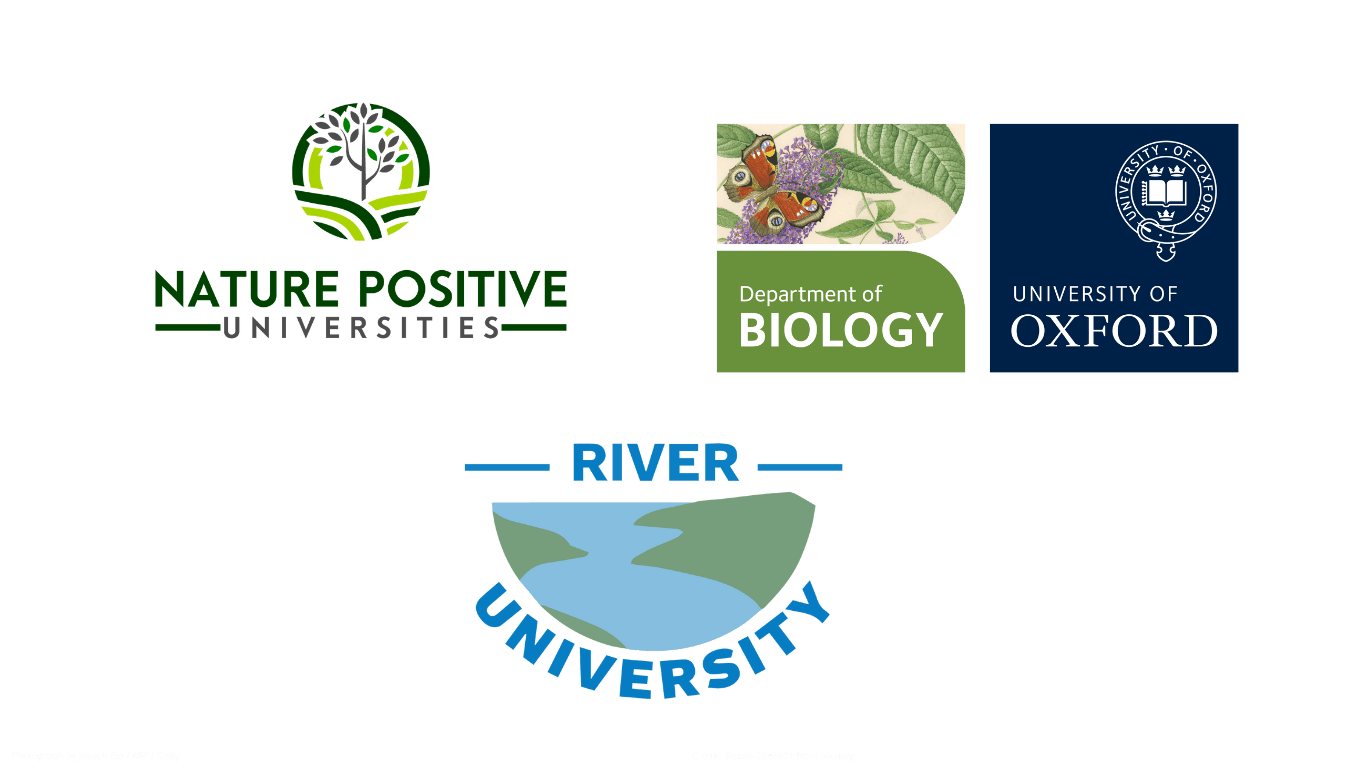CCB River University joined the new global initiative “Nature Positive Universities Alliance”
Higher education sector commits to reverse biodiversity decline through worldwide Nature Positive Universities Alliance, a new global initiative launched by the University of Oxford and the UN Environment Programme (UNEP) during the 2022 UN Biodiversity Conference – COP15.

OXFORD, MONTREAL, WORLDWIDE - December 8th, 2022 – Today, at the UN Biodiversity Conference (COP15) in Montreal, the University of Oxford and UN Environment Programme (UNEP) announced the launch of the
Nature Positive Universities Alliance [1] –
a global network of universities that have made an official pledge to work towards a global Nature Positive goal in order to halt, prevent and reverse nature loss through addressing their own impacts and restoring ecosystems harmed by their activities. This push is part of the
UN Decade on Ecosystem Restoration [2], a movement to avert climate catastrophe and mass extinction.
Full video available here.
One of the most precious ecosystems for a healthy environment and for our society are free-flowing rivers and other freshwater bodies. Nowadays, our water security is facing different threats, and the environmental catastrophe on the transboundary Odra River along the border of Poland and Germany is one of the tragic examples. “Through CCB River University [3], we contribute to and support rivers restoration in the Baltic Sea catchment and all over Europe, endorsing the EU Commission´s proposal for a Nature Restoration Law [4] – to which we also made an input to” – said Ewa Leś, founder of the CCB River University, co-founder of the Polish Save Rivers Coalition and CCB Eutrophication Working Area Leader.
Video message from Ewa Leś, CCB
The Nature Positive Universities Alliance, with 111 universities from 44 countries, brings higher education institutions together to use their unique power and influence as drivers of positive change. Universities already carry out environmental and conservation research to help inform government and company action, but by publicly tackling their own supply chains and operational impacts on nature, universities can help guide the wider community on a path to address the twin climate and ecological crises.
The initiative is part of the UN's Decade on Ecosystem Restoration and builds on the University of Oxford's experience in setting an ambitious target for biodiversity net gain by 2035 alongside net zero commitments. Oxford's Environmental Sustainability Strategy is founded on a study which quantified its environmental footprint and established a framework to address them.
E.J. Milner-Gulland, Tasso Leventis Professor of Biodiversity at the Department of Biology, University of Oxford, and co-founder of the Nature Positive Universities Alliance, said: "As universities, we occupy a unique position in educating future leaders, researching solutions to environmental challenges, and influencing our communities and governments. By addressing our own institutions' environmental impacts, we can be powerful thought leaders while also directly contributing to restoring nature."
All the founding universities announced today have pledged to assess their impacts to determine the most impactful initiatives to introduce, and to report on their progress. Examples of initiatives so far have included:
- Establishment of nature-friendly infrastructure such as ecological corridors at University of Buenos Aires, Argentina and University of Campinas, Brazil and new green walls at the UK’s University of Lincoln to support pollinators.
- Contributing to afforestation and restoration through the development of institutional forests at Government Dungar College in Bikaner, India, and the University of Aveiro, Portugal.
- Supporting and contributing to rivers restoration and freshwater ecosystems protection at CCB River University across the Baltic Sea Region, as well as the sustainability of the initiative itself.
- Completing university-wide surveys and audits of biodiversity at the University of Turku, Finland, and targets to increase biodiversity for all University of Melbourne campuses.
- Improving their supply chain through sustainable catering, such as reducing food waste and more sustainable menus at the University of Oxford and producing high quality farmed produce on its land to supply university canteens at Ahmadu Bello University, Nigeria.
- Commitments to improve operational footprints, such as achieving Green Lab accreditation across all University of Exeter laboratories.
- Establishment of regional hubs of universities collaborating towards a nature positive goal in Algeria, Nigeria, India and Canada.
The network also includes a Student Ambassador Programme, which totals over 100 students from across 35 countries who are taking action toward nature positive awareness and approaches on their campuses. They are encouraging their universities to make an official pledge, through advocacy, organization of nature-positive activities such as volunteering for nature restoration, establishment of sapling nurseries and using their studies to further advance their institutions’ sustainability.
The Nature Positive Universities Alliance is calling on other Universities worldwide to join its collaborative network and to make an institutional Nature Positive pledge. Information on different ways for universities and their members to engage, or how to ask your university to consider making a pledge, can be found at www.naturepositiveuniversities.net.
-ENDS-
NOTES TO EDITORS
About the University of Oxford
Oxford University has been placed number 1 in the Times Higher Education World University Rankings for the seventh year running, and number 2 in the QS World Rankings 2022. At the heart of this success are the twin-pillars of our ground-breaking research and innovation and our distinctive educational offer.
Oxford is world-famous for research and teaching excellence and home to some of the most talented people from across the globe. The Department of Biology is a University of Oxford department within the Maths, Physical and Life Sciences Division. It utilises academic strength in a broad range of bioscience disciplines to tackle global challenges such as food security, biodiversity loss, climate change and global pandemics. It also helps to train and equip the biologists of the future through holistic undergraduate and graduate courses. For more information visit www.biology.ox.ac.uk.
About the UN Environment Programme (UNEP)
UNEP is the leading global voice on the environment. It provides leadership and encourages partnership in caring for the environment by inspiring, informing and enabling nations and peoples to improve their quality of life without compromising that of future generations.
***
[1] Official Press Release.
About Nature Positive Universities
Nature Positive Universities began in 2022 as a partnership between UNEP and the University of Oxford, established off the back of research by the Department of Biology into the University’s biodiversity footprint. The aim is to engage Universities in the prioritisation of nature restoration within the higher education sector, which will form a major contribution to the UN Decade of Ecosystem Restoration and the Sustainable Development Goals. Universities have a substantial role to play in moving urgently from degrading nature to restoring it: our students are our future leaders, we create knowledge and nurture thinkers, and we directly impact the planet as land owners and consumers. Uniting universities for ecosystem restoration therefore has wider impact into our local communities and beyond.
More information can be found at www.naturepositiveuniversities.net
[2] About the UN Decade on Ecosystem Restoration
The UN Decade on Ecosystem Restoration 2021-2030, led by the United Nations Environment Programme, the Food and Agriculture Organization of the United Nations and partners, covers terrestrial as well as coastal and marine ecosystems. A global call to action, it will draw together political support, scientific research and financial muscle to massively scale up restoration. Find out how you can contribute to the UN Decade. Follow #GenerationRestoration.
[3] CCB River University is based on an annual international gathering to create a strong center of modern knowledge, linking experts, inviting river stakeholders and giving the opportunity to participants to learn about peculiarities of different rivers in the Baltic Sea Region and Europe. More info: https://www.ccb.se/river-university
[4]
EU Nature Restoration Law:
https://environment.ec.europa.eu/topics/nature-and-biodiversity/nature-restoration-law_en


